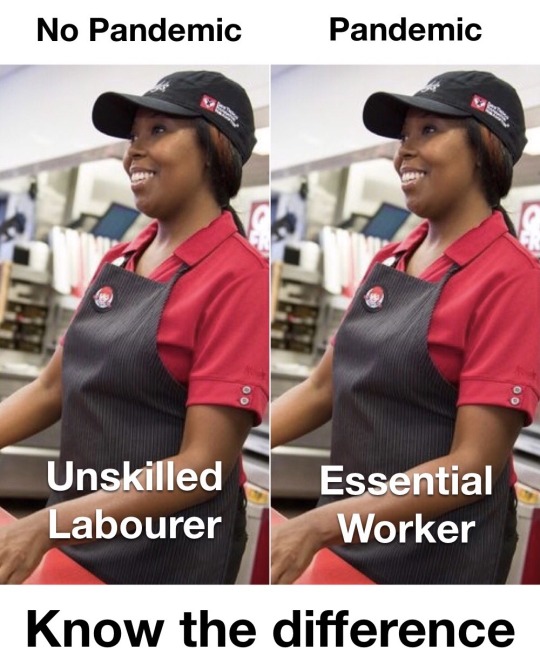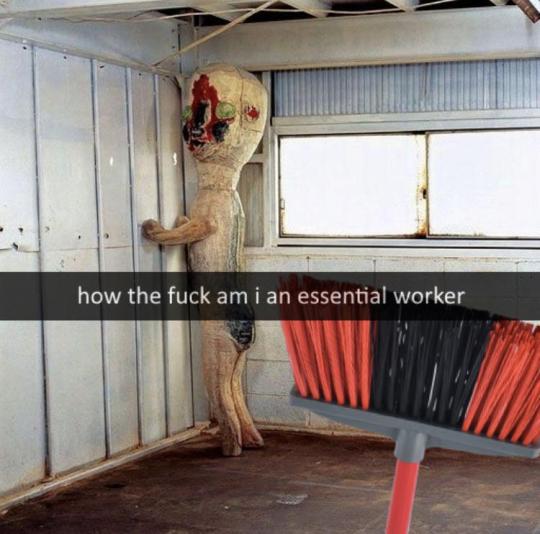#essential workers
Text
The market-based value of activities/labor is wrong and unjust.
Workers who are labeled essential during a pandemic are underpaid. If the economy can not function without them, we must re-evaluate their wages and their importance.
#HaJoonChang
448 notes
·
View notes
Text
Dear french people in america:
Please fucking tip
I don’t care about whatever cultural norms you have in france, people here need tips to pay rent. And no, a back of house fee is not the tip. If it were, it would say “tip” not “back of house fee”.
107 notes
·
View notes
Text
The City of Winnipeg and its largest union say they're willing to work out a deal to broaden the definition of an essential city worker — and in effect, determine who won't have the right to strike.
On Tuesday, city council's executive policy committee voted unanimously to put off a plan to ask the provincial government to legislate a broader definition of an essential municipal worker.
Right now, only Winnipeg police, paramedics and firefighters are considered essential and do not have the right to strike.
Full article
Tagging: @politicsofcanada
#cdnpoli#canadian politics#canadian news#canada#canadian#winnipeg#manitoba#workers rights#essential workers#right to strike#city workers#essential city workers
38 notes
·
View notes
Text
One of the largest freight railroads in the world, CSX, announced a deal with two rail unions, including Weaver's, to provide four days of paid sick leave annually, plus the option of converting three personal days into additional paid sick time.
"It's very exciting. It's a good faith effort to show that we're essential employees rather than expendable," Weaver said this week. "It gives me hope."
In fact, more discussions are already underway, with unions reporting they have reopened negotiations with other freight railroads to add paid sick leave.
36 notes
·
View notes
Text
AN OPEN LETTER to THE PRESIDENT & U.S. CONGRESS; STATE GOVERNORS & LEGISLATURES
Act Now: Save Public Transit from Extinction!
2 so far! Help us get to 5 signers!
I am writing to highlight the critical state of public transit in the United States and urge your support increased investment in this essential service. The challenges facing public transit—under-investment, over-reliance on car ownership, and racial disparities—have been exacerbated by the COVID-19 pandemic. It is imperative that we take bold action to address these issues for the benefit of our communities and our future.
Investing in public transit is not merely a matter of convenience; it is a necessity for tackling climate change, advancing equity, supporting essential workers, and fostering economic recovery. The largest source of carbon emissions in the U.S. stems from transportation, and increased investment in public transit can significantly reduce this impact. Furthermore, public transit plays a crucial role in providing equitable access to jobs, schools, and services, especially for those who cannot afford or do not have access to private vehicles.
With over 2.8 million essential workers relying on public transit, our pandemic response and economic recovery hinge on the strength and viability of our transit systems. According to studies, sustained investment in public transportation yields substantial economic returns, with every $1 billion invested annually resulting in approximately $5 billion in additional GDP.
I commend initiatives like the Green New Deal for Transportation and efforts by organizations such as the CHARGE coalition to electrify and expand public transportation. These initiatives are pivotal in shaping a more sustainable and equitable transportation system for all Americans.
Therefore, I urge you to support emergency relief funding for public transit and join the movement to rebuild and improve our public transit system. This is not just an investment in infrastructure; it is an investment in our collective future.
Thank you for your attention to this urgent matter. I look forward to your support in advancing policies that will ensure a robust and accessible public transit system for all.
📱 Text SIGN PZHBAF to 50409
🤯 Liked it? Text FOLLOW IVYPETITIONS to 50409
💘 Q'u lach' shughu deshni da.
🏹 "What I say is true" in Dena'ina Qenaga
#ivypetitions#PZHBAF#resistbot#walkable cities#no cars#public transport#Public Transit#Transportation#Infrastructure#Equity#Climate Change#Essential Workers#Economic Recovery#Green New Deal#Sustainability#Community Access#Environmental Impact#Racial Justice#Urban Mobility#Public Transportation#Advocacy#Investment#Congress#Government#Policy#Legislation#COVID-19 Response#Public Health#Environmental Justice#Social Equity
2 notes
·
View notes
Text
4 notes
·
View notes
Text
The amount of times ive had customers walk into the back of the department is absolutely astounding. Someone paged me while i was on my break yesterday, and the second I'm back on the clock shes already in the back of my department looking around for who knows what.

Mind you i was the only person in my department at this time and i have a legal right to eat when working a 7 hour shift.
2 notes
·
View notes
Photo

“The risk is too high and we pay with our lives”
Graphic by Theo Thirdaye
102 notes
·
View notes
Text
I just wanna add to the whole “fast food workers dont deserve the shit enraged costumers give us” conversation.
Most staff at the fast food place I work at only know enough english to take orders and do their job. This isnt uncommon in america. When people speak fast they are harder to understand. When people are angry, they tend to speak loud, fast, and slur their words. Theres also the general stress of working minimum wage on top of that. When we mess up, and we do, slow down your speech and try to understand that the worker is human. They will do everything in their power to get you what you ordered, because it is their job. And also, mumbling doesnt help either, its okay to ask to fix an order. Just be clear in how you speak and the stress will be far less for everyone involved. Even if they ARE fluent in english/your first language slowing down and trying to be clear can help because when we’re working we have a lot going on.
#fast food workers are NOT robots#also the kiosks arent there to replace me they’re there to make a short staffed day less stressful#we will take ur order if you need us to. customers ARE priority#its just when a massive group of teenagers comes in and we’re short staffed#or when a big group comes i#if they understand how to work it it makes things easier#also creates new positions. i work in the dining room instead of behind a register#fast food#karens are silly#the term karen is weird i dont like it. ppl just label whoever they want it#like yes theyre angry but dont dehumanize karens either#essential workers#minimum wage
3 notes
·
View notes
Text
Despite My Numerous Disabilities, I have Managed to Teach as A Substitute Teaching Assistant at My Local School District for almost 5 years, now, I work with Early Childhood Intervention Pre-K Students 3-5 years old, General Education Pre-K Students, 1st-5th with Severe Disabilities and 9th-12th with Severe Disabilities & I used to work with Students in The Behavior Mastery Classroom, 1st-5th, and most recently, rarely with 9th-12th, Students in The Behavior Mastery Classroom!
#jobsuccess#true grit#overcoming#disabilities#determination#perseverance#persistence#overcoming depression#mind over matter#hard work#teachers#everyday heroes#essential workers#substitutes
7 notes
·
View notes
Text
Friendly reminder to Americans grocery shopping this week.... PLEASE be kind to us grocery store employees. Thanksgiving is our busiest week and we're doing our best to help you get ready on top of our own plans too!
I work in a deli and my store does a TON of catering, so we have to deal with those orders on top of whatever comes through the deli normally. So please be kind and patient with us, we're doing our best!
13 notes
·
View notes
Text

Essential Worker by Jeanie Tomanek
“The acts of most people do not effect the world but function at a level of wholly contained effects of the world's turning. In contrast the proletariat's anti-act, the act of non-production or of ceasing work, instantly has effect (like in a dream) on capitalism as a whole (in the past few months, lorry drivers, postmen, tube workers, and now railway guards have stopped sectors of the British economy). Most workers are now employed in sectors that are peripheral to the economy's well-being; if they take industrial action it causes inconvenience only to the immediate employer and perhaps a few companies up and down the supply chain. In contrast the essential proletariat is that group of workers who can halt vast areas of the economy by stopping their work.
These workers are employed in the economy's core industries, industries that can only operate with a relatively high level of labour input into their processes, which gives to those workers an already existing control over process; core workers' latent power can be demonstrated immediately in industrial action which spreads its knock-on effect to all businesses in the locality and beyond, producing spiralling repercussions in society. Core-workers include factory workers, dustmen, power workers, distribution workers (post, rail, road haulage, ferries, dockers, etc; in all of these examples the cessation of work causes immediate and widespread problems for the economy, and this is why it is precisely in these industries that wildcat action is most frequent. Quite simply, industrial action in these industries has a history of success.
Our certainty concerning the revolutionary potential of the essential proletariat is not at all founded upon a presumption of the superiority of life lived as a proletarian, or that working class existence is an end itself that should be pursued by pro-revolutionaries. We do not see the modes of working class organisation as an indicator of a possible, post-revolutionary future, nor as an inherently preferable, that is, more morally pure, existence in the present, as compared with middle class life. We say this because these are the pretended presumptions of many inverted snobs in the Class Struggle movement - they tick off proletarian characteristics like naturalists identifying a separate species. We do not pointedly prefer football to opera; we do not think it is better, more pure, more human to be poor than to be rich. We do not think it is inevitable that human kindness is more likely to be encountered in working class individuals than in middle class individuals. We do not think working class people are better than anybody else because they have been defined as belonging to one or other social category. We are not interested in working class culture. We do not accept that you can be working class if you are not employed as a worker no matter what your family history (this is not intended as an insult or slight on people's sense of themselves and where they come from, but we are bored with university lecturers who use "life was hard back then" as a means of asserting their authority). Quite simply, we see the working class as being an economic function organised as part of capitalism and not as being an ethnic identity. If you are no longer employed as an industrial worker then you are not an industrial worker. The same goes for industrial workers when they are on holiday, off sick, in the pub, or indeed any time when they are not present on the actual production line; that is, any time they are not working or having an effect on their work (in official or unofficial industrial action, when they are preventing production).
We are not interested in theoretically expanding the working class to include all militant formations from blacks, gays, women, disabled, to peasants. We are not interested in the working class becoming more human (that is, more political) by means of a raising up through consciousness. We do not celebrate the working class: working class life is rubbish, it is not a condition to be aspired to, and the past thirty years of pro-revolutionary fetishisation of the proletariat as a thing in itself (the legend has it that the leftist group Militant used to force its activists to wear flat caps and donkey jackets on their paper sells so as to fit in) has mistaken and confused the actual power of the working class and reduced the proletariat to the status of just another oppressed minority. Finally we do not endorse the delinquency of the underclass or interpret it as rebelliousness, we see permanent delinquency as the psychological absorption of dehumanisation, no more than a v-sign offered by one who is standing in quicksand. Underclass delinquency fulfils the function ascribed to it by the state: it causes life, particularly that lived on the housing schemes, to be even more constrained than it is already by employment
The working class is nothing but the collective position of those who are brought closest to the machinery of the capitalist system; a human function in the capitalist machine; the working class are the revolutionary body because of, and only because of, their position in the capitalist economy - they are the one social body that can close the system down.
From our experience we see the proletariat as being made up of many individuals, all different, and with just one thing shared by all of them - they have the same economic position, they all have the same functional status (labour) and all have the same economic value (wages). If general circumstances force you to work in an essential industry (and by essential we mean those industries that will make the continuation of capitalist society impossible by their absence) then you are a proletarian. This social status is not something to be fetishised, it's just a fact.
The working class is merely a function of the capitalist economy. We are interested in the proletariat only to the measure that the proletariat literally has in its hands the levers of capitalism's power. Only those who can be effective will be effective.
As for the left, everywhere we see unresurrectable and useless acts, which no matter the intention connect only with institutions that were formed ages ago: revolution has become, for too many, the smashing of mirrors. At the moment this is called anti-capitalism. There are no revolutionary means of connecting to society, there are no means of escaping absolute containment by institutional determinations, except in the locus of production; factory production is where society's power originates and it is the only place where it can be directly engaged for certain. Outside the factories all is spectacle, all is mirrors. Every nonproductive social form is more or less unreal and engaging with them in political terms is always a move into falsity.” - Monsieur Dupont, ‘Nihilist Communism: A Critique of Optimism in the Far Left’ (2009) [p. 21 - 25]
#dupont#monsieur dupont#nihilist communism#nihilism#communism#pessimism#optimism#essential workers#proletariat#tomanek#jeanie tomanek#working class
2 notes
·
View notes
Text

#blue lives scatter#only blue lives matter#cops#nurses#covid-19#essential workers#hospital#pre-vaccine times
53 notes
·
View notes
Text

10 notes
·
View notes

